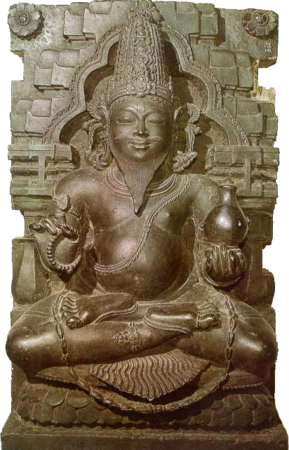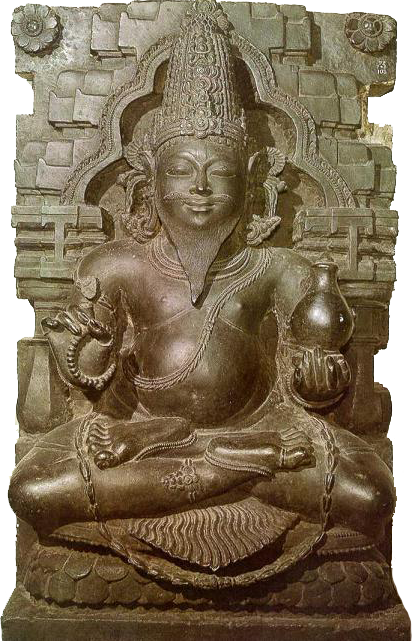Devaguru Bṛhaspati Center is a subsidiary of SJC (Śrī Jagannāth Center) with the objective of bringing out the traditional wisdom of the vedic seers which has been passed down through generations of vedic astrologers residing in the coast of Puri at Odissa state.
Meanings
 Bṛhaspati (बृहस्पति) has been extolled in the Vedas as the giver of vedic speech (vacaspati) and the knower of all truth (satya). We believe that any being who seeks the truth in any form or manner is being impelled by Śrī Bṛhaspati and can reach the goal only through such divine guidance.
Bṛhaspati (बृहस्पति) has been extolled in the Vedas as the giver of vedic speech (vacaspati) and the knower of all truth (satya). We believe that any being who seeks the truth in any form or manner is being impelled by Śrī Bṛhaspati and can reach the goal only through such divine guidance.
Devaguru (देवगुरु) literally means the guru of the devas. The whole of mankind worships various gods for their favour and support in life and these gods grant their well-being and protect their earthly existence. But where do these gods get their guidance and spiritual prowess to rule over the destinies of men? It is their guru, a teacher-god we call Bṛhaspati who guides them in attaining these supreme powers from the triad – Brahma, Viṣṇu and Rudra, the three highest manifestations called guṇa avatāra. It is evident then that without such guidance these gods cannot rule over the world of man nor can they be of any help in protecting or blessing him. A well-known case is the fall of Indra, the king of the gods, from power whenever his ego gets the better of him. And it is through the divine guidance of Devaguru Bṛhaspati that he reclaims his position and glory. We these thoughts we pray to the knower of the supreme truths to guide us through the darkness of this kali yuga and grant us the knowledge of veda and vedāñga.
ॐ देवगुरु बृहस्पतये नमः
om devaguru bṛhaspataye namaḥ
Mythology
Bṛhaspati is the second son of Maharṣi Aṅgirāsa1 and his most beautiful wife Surupā (Shiva Mahā Purāṇa). He has two brothers – elder brother Utathya and younger brother Samvartana. He has seventeen children through his three wives. His first wife Śubhā gave birth to seven daughters Bhanumatī, Rāka, Archiśmatī, Mahāmatī, Mahiśmatī, Sinivālī, and Haviśmatī. His second wife Tārā gives birth to seven sons and a daughter while his third wife Mamata, begot two sons, Kacha and Bharadvaja. Kacha was famed for getting the Mṛtyuṅjaya mantra from Sage Śukrācārya while Bharadvaja is famed for meditating with Maharṣi Atri to get the greatest mantra defining god – ॐ (om).
Sādhanā
It is important to note that none of the devatā in the vedic mythology has attained anything without penance. This is the single most important teaching of the Vedas in that hard work and sincerity is the sole means to attain success. This is called sādhanā.
Bṛhaspati attained his position as the preceptor of the Devas, by performing penances on the banks of Prabhas Tīrtha (Somanāth). Lord Shiva granted him the high status of being the preceptor of the devas, as well as the position as one of the Navagraha (Nine Planets). It is evident that whenever Bṛhaspati is associated with a house of worship, it will show the worship of Lord Śiva. Further, since Lord Śiva does not worship Himself, Jupiter in the chart personifies brāhmaṇa (priests, sages, seers) especially when in friendly or unfriendly signs he represents the pious people in bhu-loka (earthly plane). However, when in own signs or exaltation Jupiter will symbolize the highest worshipper of Lord Śiva that is Lord Viṣṇu Himself. For this reason, when Jupiter is in own signs he represents a higher level than the navagraha who are in bhuva-loka. He represents he ākāśa tattva which is ruled by Viṣṇu and due to this high manifestation, the worship or adoration of Lord Śiva is as high as that of Viṣṇu for Śiva.
Devaguru Bṛhaspati Center is formed to teach courses, both online and with some contact classes, to propagate the words of the vedic seers so that humanity can have the auspicious association of Lord Śiva by walking the righteous path of Viṣṇu with the brilliant light of jyotiṣa (Sūrya).
1. दधिक्राव्ण इद् उ नु चर्किराम विश्वा इन् माम् उषसः सूदयन्तु ।
अपाम् अग्नेर् उषसः सूर्यस्य बृहस्पतेर् आङ्गिरसस्य जिष्णोः ॥
dadhikrāvṇa id u nu carkirāma viśvā in mām uṣasaḥ sūdayantu |
apām agner uṣasaḥ sūryasya bṛhaspater āṅgirasasya jiṣṇoḥ || Rig Veda 4.40.1
